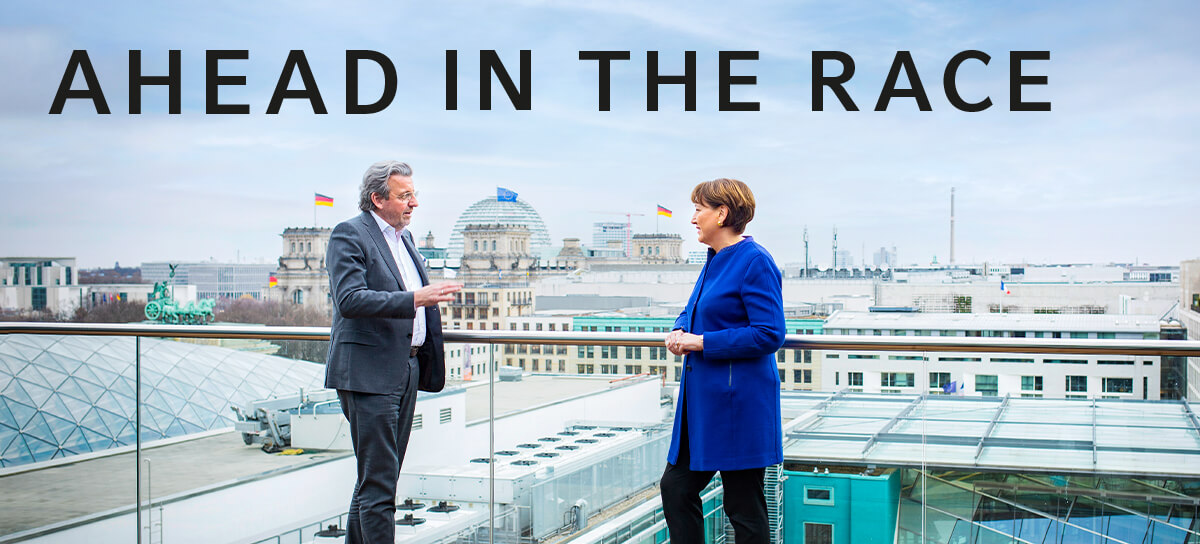
Ahead in the race
The car as we know it is evolving. In the future, it will be powered by new drive technologies, offer the experience of digital worlds, and drive around with increasing autonomy. The automotive industry is thus on the cusp of a historic transformation: powertrains, business models, connectivity – everything is being re-envisioned. Dr. Stefan Wolf, CEO of ElringKlinger AG, talks to Hildegard Müller, President of the German Association of the Automotive Industry, about how this transformation can succeed.
Ms. Müller, Dr. Wolf, if you were to compare the transformation in the automotive industry to a Formula 1 race, what stage would we be at?
Hildegard Müller: Following a barnstorming start, we’re now coming into the first bend.
Dr. Stefan Wolf: I’d say the same, but also that the race is now picking up speed very quickly.
By “first bend,” you mean that the race still has a long way to go.
Müller: For a transformation to succeed, you need to be able to take the long-term view. You can tell that it’s still early days in the race because the political and legal framework has only just been put in place. Every race needs its direction and route to be clearly marked out like this. And now it is: Germany’s new coalition government wants 15 million electric cars by 2030, and the EU’s “Fit for 55” package includes the target of reducing CO2 emissions by 55 percent by 2030 compared with 1990 levels. These are some ambitious goals, and Germany’s automotive industry is ready to really get motoring for the mammoth task that this transformation represents.
How would you rate the chances of the German automotive sector in this race?
Wolf: Though the German automotive industry might not be ahead across the board at the moment, German technology is the global leader in many areas. Overall, we’re in a strong enough position to be well out in front. Success will hinge on our ability to launch technical developments that can be marketed globally. Rather than being restricted to Germany or Europe, climate action is a global issue. With the combustion engine, German carmakers and suppliers have demonstrated for many years that they can develop the best technology in the world. Now we need to get ahead when it comes to these new technologies as well.
Müller: However, it’s also clear that a race like this is going to have the odd tight curve and other surprises in store. Just think about Formula 1, when the heavens suddenly open and teams need to react quickly and switch to different tires. This is exactly the challenge facing us in the automotive industry: we need to be responsive. However, the government needs to play its part too. It has to make sure that we’ve got the best possible setup so that we really can perform to our full potential.

The meeting took place at Berlin’s China Club, a stone’s throw from the Brandenburg Gate.
What measures are you thinking of specifically?
Müller: Three things. First of all, any country that sets ambitious climate targets must also ensure that it makes itself the best place for industry to do business, in terms of taxes, charges, levies, and energy costs. Second, the infrastructure that this transformation requires has to be in place – both digital infrastructure and enough charging stations and energy. This is crucial, because it’s already clear that the amount of renewable energy we’re producing won’t be sufficient to meet the huge quantities of electricity that we’ll need on a daily basis in Germany in 2030. Third, geostrategic challenges have become more important in recent times – this is something we’re seeing at the moment with raw material shortages but also with economic disputes between countries. For all three things, we in the automotive industry are reliant on the government taking action. In other words, we can’t win the race on our own. We’d like to call on everyone involved in this transformation to now roll up their sleeves and make a committed contribution.
Wolf: Although we shouldn’t forget a key player in all this: the consumer. Regardless of what targets the government sets, it is ultimately consumers who will decide whether electromobility is going to be a success. And they won’t buy an electric car unless they can be sure they’ll have enough places to charge it. And do so cheaply. And not only in Germany, but also in France, Spain, or Italy, because people like to be able to take their car on holiday, after all. We need a pan-European solution to this problem.
Müller: With the wide range of issues, you quickly realize that it’s not enough to simply pick a target and say: “Right then, off you go and meet it!” Will we achieve the goal of transformation? Yes, that’s what we’re working toward. As for how we’ll do it, however, that’s undecided to a certain extent. We’ll keep on making minor adjustments to the course we’ve set; we’ll see technical innovations that bring us further forward. What we mustn’t forget in all this, and here I agree completely with Dr. Wolf, is considering people’s day-to-day reality. We can’t be allowed to overburden consumers – we have to convince them. That’s the key to a successful transformation.
One of the realities is an uncertain global situation. All it takes is a ship stuck in the Suez Canal to throw the global economy off balance. And then there are conflicts, protectionism, the pandemic. Dr. Wolf, what has your experience of this volatility been like as a company?
Wolf: There are bottlenecks in supply, no doubt about it. All the talk is of memory chips, and those are definitely thin on the ground, but there’s a host of other shortages that are hitting us even harder. We’ve got supply issues with steel, aluminum, and plastic pellets. Plus energy costs are skyrocketing, particularly in Germany: we operate at 45 sites around the world, and our German ones pay by far the most for their energy. Although I’m confident that these bottlenecks will sort themselves out, the situation is making planning a challenge at the moment.
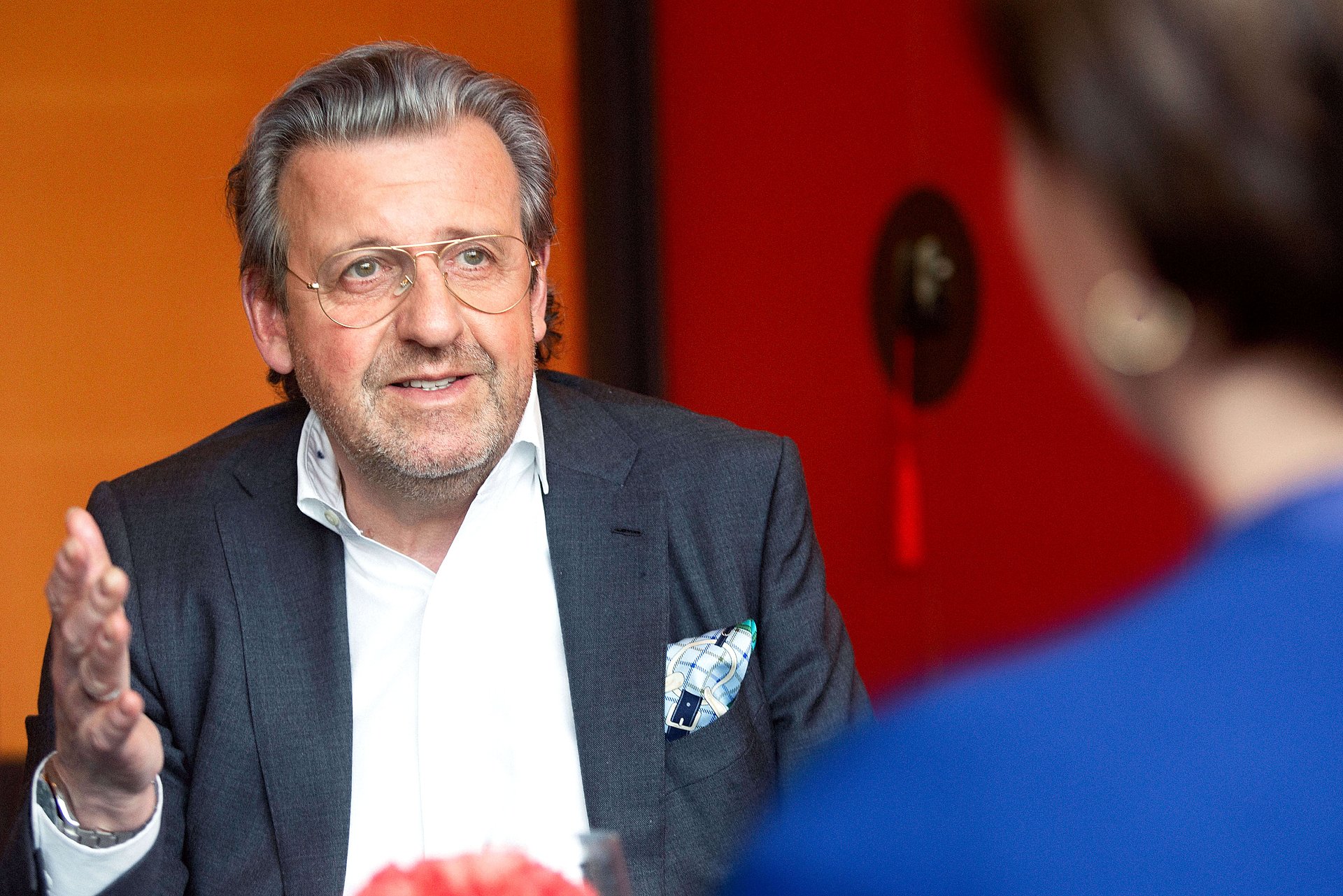
"People want freedom, which is why individual mobility will also be the most important factor in 2050."
Dr. Stefan Wolf,
CEO of ElringKlinger AG
Faced with these volatile circumstances, how can companies in the automotive and supplier industry succeed?
Müller: As a company, it’s never a bad idea to strengthen your core areas of expertise, i.e., take the things that you can do better than everyone else and develop them further. However, the boundaries between industries are definitely becoming blurred. Digitalization is opening the door to completely new business models, and companies will benefit from asking themselves again and again if there are any new sectors they might move into. These are turbulent times, no doubt about it. But times like these always present opportunities to companies as well. The way in which ElringKlinger has evolved is a prime example, as we know.
Wolf: It’s true that we began our development work as many as 20 years ago, first with stacks and then with complete systems for fuel cells. We started with battery technology about 15 years ago and are now able to mass-produce both technologies. These strategic decisions were born out of my prediction that the number of vehicles fitted with combustion engines was going to decline some day. I wouldn’t have expected this to happen so quickly but I was sure it would eventually. And as we as a supplier were so heavily dependent on the combustion engine back then, it was my job as a businessman to find ways of offsetting this loss we were anticipating.
What was your starting point with these considerations?
Wolf: I asked myself “What can we do?” Make layers of cylinder-head gaskets, for example: thin metallic plates – punched, stamped, heat-treated, and coated. And what do you need for a fuel cell stack or for cell connectors on the battery module? Thin metallic plates – punched, stamped, heat-treated, and coated. Our task was therefore to take what we could already do and apply it to new products. We succeeded in this, which is why we are already a good distance ahead of the companies that are only now embarking on the process of transformation.
Sounds really straightforward.
Wolf: Wasn’t always, though. [laughs] I can remember some tough discussions at Supervisory Board level, when we on the Management Board needed yet another EUR 10 or 20 million for investments. Back then, I was often confronted with the same question: “When is all this going to pay for itself?” Nowadays, even these critical voices know what it was all in aid of.
Müller: It’s this ability of the entrepreneur to take the long-term view that invariably turns German automotive companies into global market leaders. You need a certain amount of strength to say: the investment we’re making today won’t pay off until ten years’ time. That’s not always easy to get across, but I’m sure that it will be similar for climate action: we’re investing now for a return that won’t come until later but, when it does, will bring lasting success.
![[Translate to English:] China Club in Berlin [Translate to English:] China Club in Berlin](/fileadmin/_processed_/a/7/csm_elringklinger-pulse-2023-ahead-in-the-race-04_cc337623aa.jpg)
" We can’t be allowed to overburden consumers – we have to convince them. That’s the key to a successful transformation."
Hildegard Müller, President of VDA
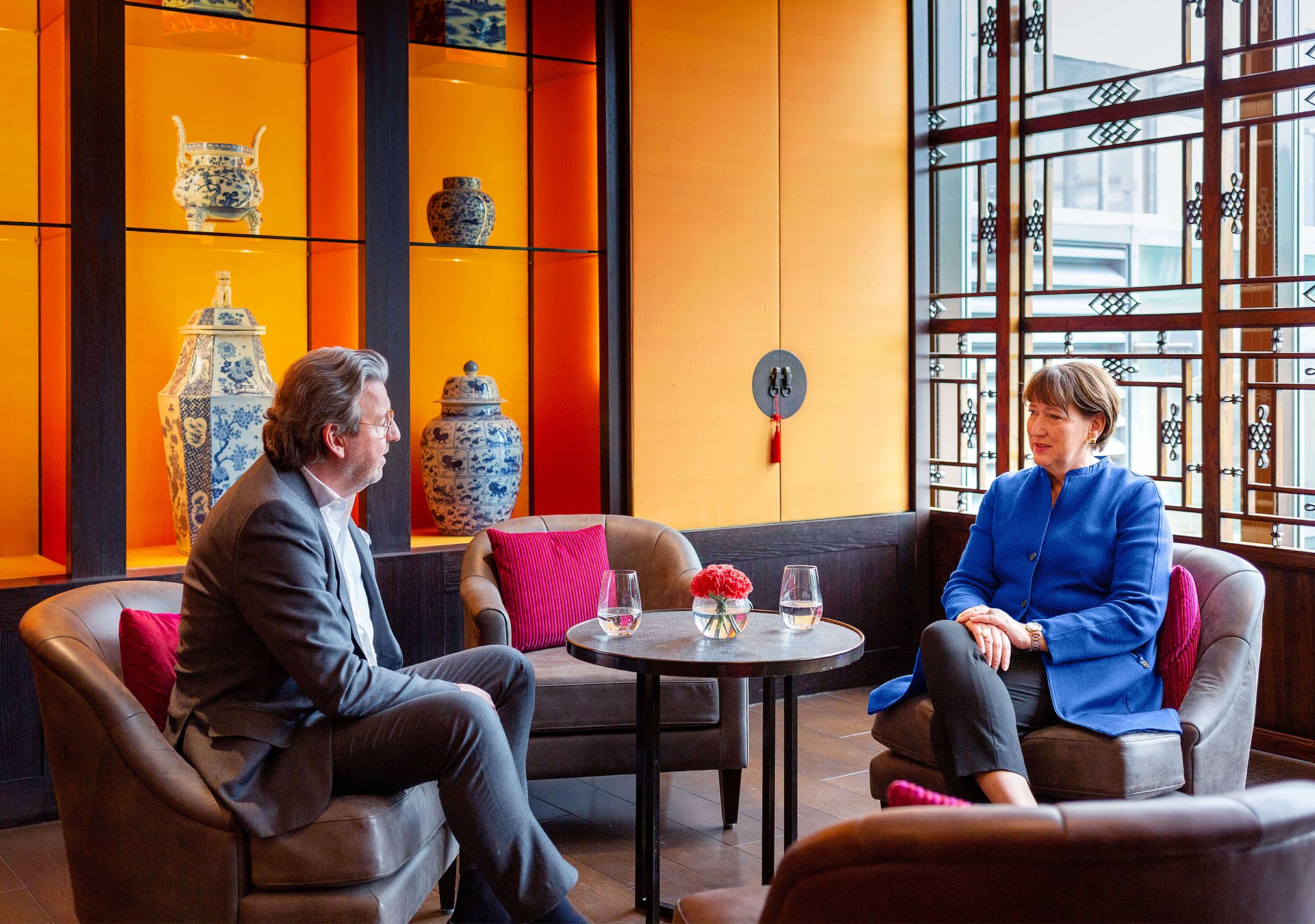
Looking ahead to 2030, what kind of mobility will we be experiencing? What role will the car play?
Wolf: A lot of the vehicles on the road will be all-electric, and many trucks and commercial vehicles will have fuel cells. However, there’ll still be hybrid versions, i. e., ones that combine electric motors and combustion engines. Many of the advanced cars will already boast autonomous driving as well as a modern and attractive design. In a nutshell: fantastic products that we will be successfully marketing all over the world from here in Germany. And it will be equally attractive for young people to work on pioneering technologies in our industry. We’re already seeing great interest in jobs in these areas among up-and-coming engineers.
Müller: As a general principle, I don’t really agree with the idea that the next few generations will be much less interested in cars. The latest figures show that more and more young people are owning a car. So young people are clearly becoming more enthusiastic about driving one – and this trend will become even more pronounced if vehicles become an increasingly autonomous, digital, and climate-friendly way of getting around. This will make driving a car a completely different feeling. Of course, however, we have to rethink mobility and need our various modes of transport to be better connected – particularly in cities.
Will we still be driving a car in 2030 – or will we be “car users” instead?
Müller: More so a user, I’d say. There’s a great benefit to be had from this, as we’ll be able to use our traveling time for other things – reading, working, playing. And driving will become even safer, cleaner, and more convenient.
Wolf: Plus there’s the fact that the car will become a communicator. Much more than now, it’ll take on the role of a mobile office in which we work within our network, make calls, and hold virtual meetings. And, while we still tend to be sealed off from the world around us when we’re driving around nowadays, in 2030 cinemas, concert halls, or restaurants that we pass by will be able to transmit relevant information into our car via digital media.
Müller: As someone who’s always on the lookout for good restaurants, I can’t wait for that. [laughs] There’s also the prospect of completely new parking guidance systems that make it much easier to find a parking space. While this is mainly an issue for the big cities, we’ll find autonomous driving systems taking over some of the work of local public transport in rural areas and thus significantly improving the range of mobility services available there. We’ll always succeed with these new services in those cases in which we’re able to give people what they need and help them live their lives. Mobility means participation – and the car is the guarantee of this participation.
"China is and will remain a massive growth market, and it would be negligent to risk our success for political reasons."
Dr. Stefan Wolf,
CEO of ElringKlinger AG
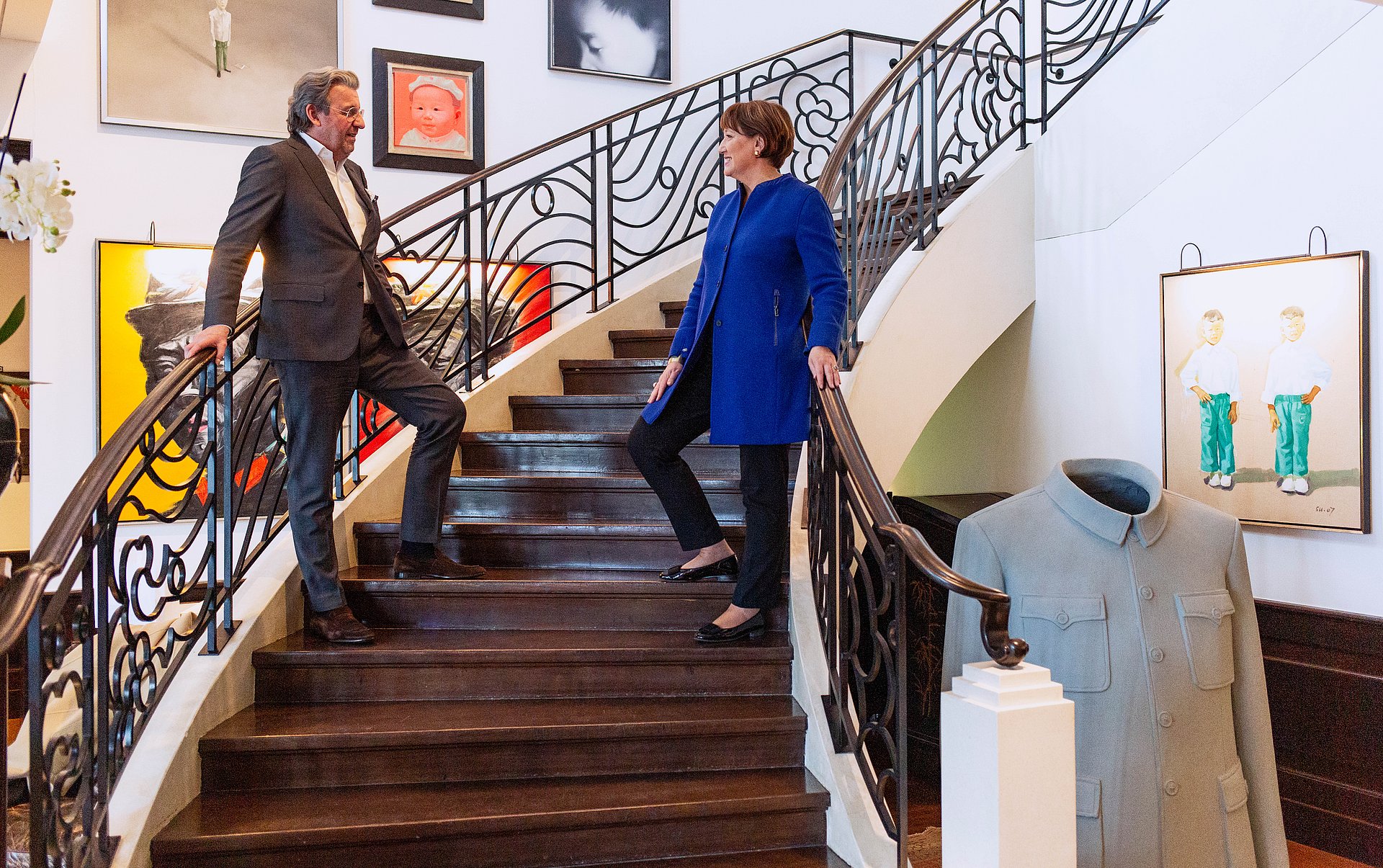
Here we are sitting in the unique atmosphere of the China Club in Berlin, so let’s talk about China: how is this market developing as far as the German automotive industry is concerned?
Wolf: China is and will remain a massive growth market, and it would be negligent to risk our commercial success for political reasons. If we lose ground over there, it’ll threaten jobs and thus prosperity here in Germany. Although we too are concerned about the human rights situation in China, it’s my firm belief that restricting economic contact can’t bring about an improvement in any way. Quite the opposite, in fact: every broken connection will jeopardize dialogue, especially since companies from other countries are just waiting to push into these markets – and that can’t be beneficial for the German economy.
Müller: Dr. Wolf is right. Allowing talks to break down is the worst thing you can do in a situation like this. As a general principle, I think that business should communicate its role as an enabler of dialogue and positive developments more clearly. Companies are key players in society that are playing a crucial role in helping to shape the future. Directly and indirectly, the German automotive industry employs nearly four million people in this country. So the companies in our sector have a lot of responsibility, which they are also largely fulfilling, e.g., via their various forms of engagement or their development of forward-looking technologies to help protect the climate. Let’s tell people about it! Dr. Wolf, as a positive, constructive person who’s committed and fond of discussion, you’re a very good example in this respect. That’s very helpful and, yes, we need more people like you.
Let’s end with a little thought experiment: if you think about mobility in 2050, what’s the first thing that comes into your head?
Müller: I’ll be sitting in an autonomous car and enjoying wonderful features that I can’t even begin to imagine today. I’m happy to let myself be surprised by the inventiveness of the manufacturers.
Wolf: People want freedom, which is why individual mobility will also be the most important factor in 2050. Cars will look different. They’ll be able to do some fantastic things, but their main job will still be to take people from A to B: fast, in comfort, and without harming the climate.
The interview was conducted by André Boße.
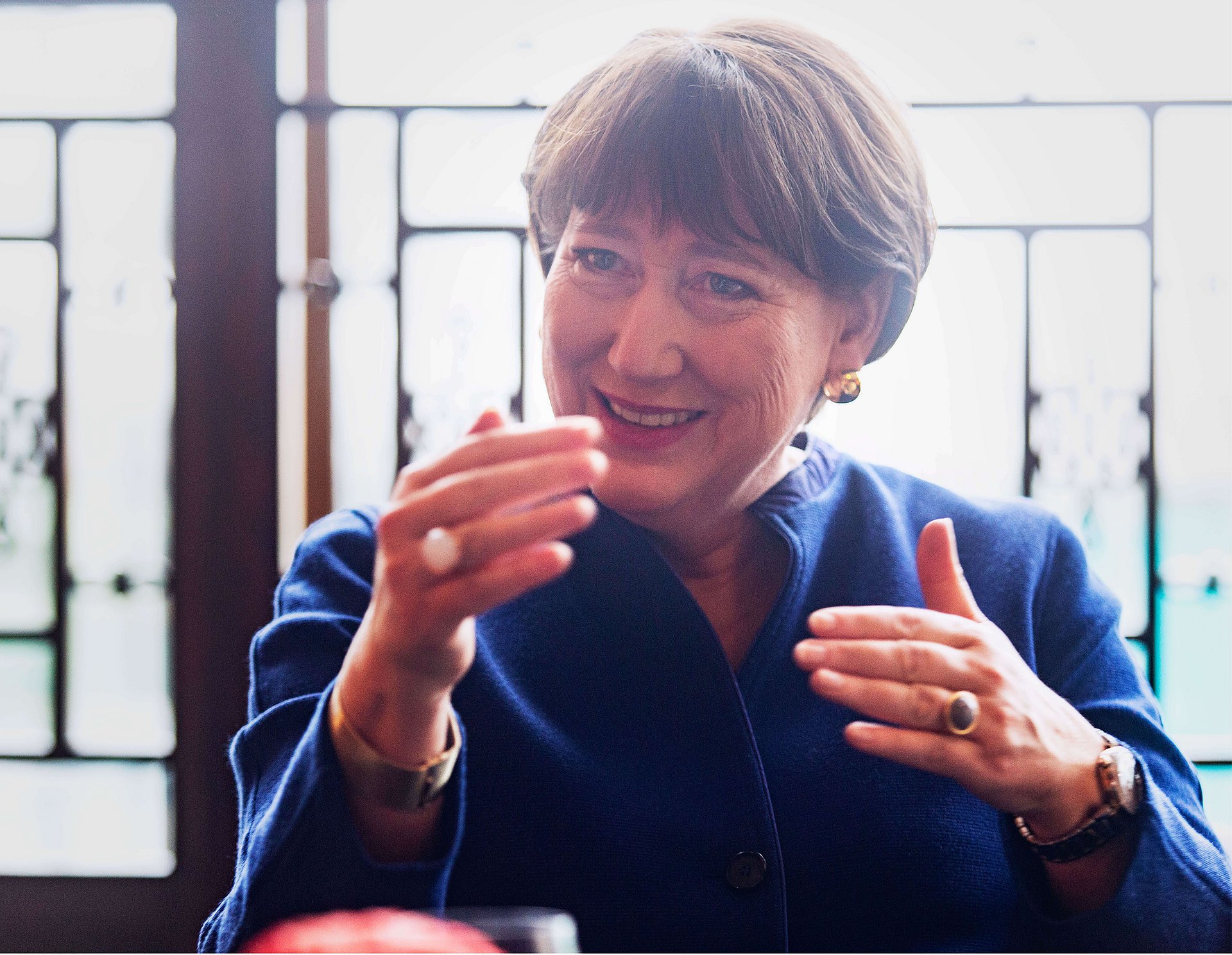
"Mobility means participation – and the car is the guarantee of this participation."
Hildegard Müller, President of VDA
Hildegard Müller has been President of the German Association of the Automotive Industry (VDA) since February 2020. Her career began with a banking apprenticeship at Dresdner Bank. She graduated from Heinrich Heine University Düsseldorf in 1994 with a degree in business administration. After university, she returned to Dresdner Bank, with her final role there being as Head of Department. She was a member of the German Bundestag from 2002 to 2008 and a Minister of State under Chancellor Angela Merkel between 2005 and 2008. In 2008, she took over as Chair of the Executive Board of the German Association of Energy and Water Industries before going on to be Chief Operating Officer Grid & Infrastructure at the energy firm Innogy.





